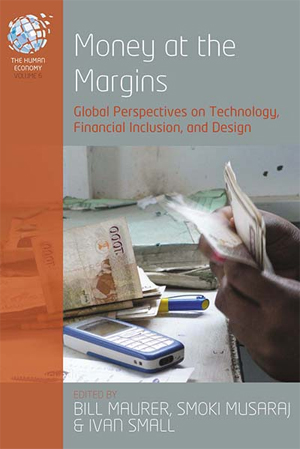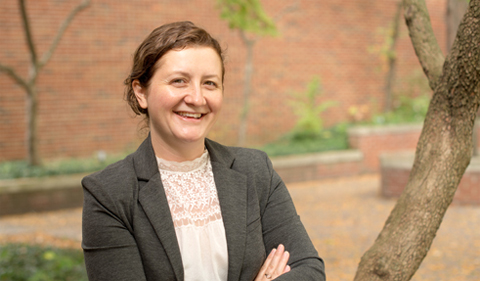The Center for Law, Justice & Culture presents book launch panel for Money at the Margins: Global Perspectives on Technology, Financial Inclusion, and Design on Thursday, April 18, from 5 to 6:30 p.m. in Bentley Hall 124.
The panelists will discuss changes in the socio-cultural meanings of money in various sites across the Global South, and the impact of new forms of money and financial services—such as mobile money and digital government grants—on development and financial inclusion. The book, published by Berghahn Books, is part of The Human Economy series.
The panel features two of the co-editors, Dr. Smoki Musaraj, Assistant Professor of Anthropology and CLJC Faculty Affiliate at Ohio University; and Dr. Ivan Small, Assistant Professor at Central Connecticut State University. Dr. Bill Maurer, Dean of the School of Social Sciences and Professor of Anthropology; Law; and Criminology, Law and Society at the University of California at Irvine, will join the conversation via Skype.
 Money at the Margins considers the impact of new monetary technologies, including mobile money, e-commerce, cash cards, retail credit cards, and more. As these technologies have become increasingly available, the Global South has cautiously embraced these mediums as a potential solution to the issue of financial inclusion. How, if at all, do new forms of dematerialized money impact people’s everyday financial lives? In what way do technologies interact with financial repertoires and other socio-cultural institutions? How do these technologies of financial inclusion shape the global politics and geographies of difference and inequality?
Money at the Margins considers the impact of new monetary technologies, including mobile money, e-commerce, cash cards, retail credit cards, and more. As these technologies have become increasingly available, the Global South has cautiously embraced these mediums as a potential solution to the issue of financial inclusion. How, if at all, do new forms of dematerialized money impact people’s everyday financial lives? In what way do technologies interact with financial repertoires and other socio-cultural institutions? How do these technologies of financial inclusion shape the global politics and geographies of difference and inequality?
Money at the Margins is the product of multiple years of research and collaboration that have emerged around the study of money and finance at the margins of global capital. Musaraj began working on this volume while serving as postdoctoral fellow at the Institute for Money, Technology, and Financial Inclusion at University of California at Irvine during 2012-14. While at the institute, Musaraj mentored research fellows, many of whom are contributors to Money at the Margins. She has since continued to collaborate with the fellows and former colleagues at the institute on this volume as well as other projects.
Musaraj is co-author of the Introduction: Money and Finance at the Margins, which outlines the contributions of the book to the anthropology of money and finance as well as to studies of development and financial inclusion.
Musaraj recently co-authored the following blog post that describes the questions and research methods that animate the book:
How we think about and what we think of as money is constantly changing. And in many cases, those changes are driven in locales that are not necessarily centers of global capital. Consider for the instance of the relatively recent introduction of ‘mobile money.’
In 2007, the Kenyan mobile network operator, Safaricom, launched a mobile payment service named M-Pesa. The service enabled people with no bank accounts (and no access to bank branches) to send and receive money via their mobile phone. By 2011, the service had enlisted 17 million subscribers; by 2014, it was estimated to have double the number of people using formal financial services in Kenya (from 30 percent in 2006 to 65 percent in 2014); in 2018, Google Play started accepting payments via M-Pesa for apps bought online in Kenya. M-Pesa is routinely cast as a technological innovation from the postcolonial South that is ushering in a new wave of financial exclusion for the so-called “unbanked.”
Over the last decade, leading international organizations such as The World Bank, government agencies such as USAID, industry trade bodies such as GSMA, and private philanthropic foundations such as the Bill and Melinda Gates Foundation and Mastercard Foundation have embraced (and are heavily investing in) mobile money and other electronic and digital financial instruments for the purpose of financial inclusion.
The proliferation of mobile money in the Global South and its embrace as a quick-fix to financial inclusion raises a number of questions of interest to scholars and policymakers of money and development: How, if at all, do new forms of money impact people’s everyday financial lives? How do these technologies intersect with other financial repertoires as well as other socio-cultural institutions? How do these technologies of financial inclusion shape the global politics and geographies of difference and inequality?
This event is co-sponsored by the Center for Law, Justice & Culture, the Sociology & Anthropology Department, the Cutler Scholars program, and the Global Studies program.




















Comments